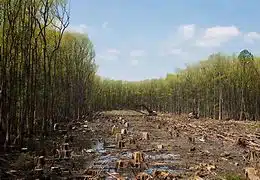Abstract
Europe is sacrificing its ancient forests for energy. Logging and clearing away trees to create new logging roads, planting biofuel crops in the wrong places, and creating fires over land to clear the way all have negative impacts on these iconic European forests. These impacts are especially acute when it comes to the Mediterranean subtropical rainforests.
Continuing deforestation in Europe threatens the continent’s biodiversity, economies, and climate change systems because if enough of these forests are destroyed or degraded, then a feedback loop can occur that speeds up climate change by making rainfall worse for a dryer climate.
The only way to prevent this from happening is to stop deforestation and protect the remaining forests.
About 60% of Europe’s temperate and boreal forests are found in the countries that border the Mediterranean and Black Seas.
These areas include southeastern European countries like Romania, Bulgaria, Serbia, Albania, and Turkey, as well as parts of Greece, Italy, Russia, and Ukraine, but also some parts of France, Turkey, and Spain.
The amount of forest cover in these areas has been dramatically reduced in recent decades, with some 90 million hectares (220 million acres) lost because of deforestation since 1968, while 30 million hectares (65 million acres) have been cleared within Europe’s borders over the same period. Deforestation of Mediterranean forests is making climate change worse because these forests store a lot of carbon and can slow down climate change.

Ancient trees play a big role
The ancient trees in these areas help Europe moderate its temperatures by absorbing carbon dioxide and retaining water because they collect moisture from the air through their leaves.
These trees also help prevent the soil from degrading, provide habitats for animals, clean the air and soil, and lower the levels of pollution in urban areas. Removing these forests will lead to problems with flooding, drought, erosion, and an increased risk of disease by increasing the amount of dust in the area.
The Mediterranean forests
The Mediterranean forests are an important source of food and lumber for those who live near them. The trees in these areas produce the nuts, fruits, and resin that provide the ingredients for cooking and medicine. The wood from these forests provides wood for construction and heating, while the bark is used to make paper. Forests are also used as recreational areas by Europeans who enjoy hiking in nature or relaxing by a campfire when they want to get away from busy urban life.
These forests are an important part of the cultural identity of many Europeans, who appreciate them not only because they exist but because they have been around for thousands of years. Across Europe, about 40% of old-growth forests have been lost since 1990.
Europe consumes the most wood pellets of any region.
In the European Parliament, a proposal that would ban nations from burning entire trees to satisfy their clean energy targets and end the majority of industrial subsidies are expected to be put to a vote. The only energy that would be considered renewable and so eligible for subsidies is energy derived from wood waste, such as sawdust.
Conclusion
To conclude this article, it is vital to drag out the idea that about 60% of Europe’s temperate and boreal forests are found in the countries that border the Mediterranean and Black Seas. The amount of forest cover in these areas has been dramatically reduced in recent decades. Deforestation threatens the continent’s biodiversity, economies, and climate change systems.
Deforestation of Mediterranean forests is making climate change worse because these forests store a lot of carbon and can slow down climate change. Removing these forests will lead to problems with flooding, drought, erosion, and an increased risk of disease by increasing the amount of dust in the area.













